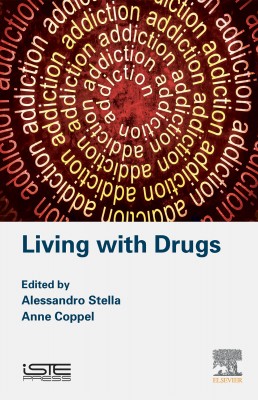
While the war on drugs is limited to a simplistic rallying cry of “no to drugs”, a diversity of approaches can open up new perspectives on the drug policies which have been tested since the beginning of the 20th Century. Living with Drugs presents the views and findings of sociologists, historians, economists, philosophers, lawyers, practitioners and activists on the use of psychotropic substances in both traditional and modern societies. It also explores the significance of this use, the consequences of the war on drugs (equivalent to a humanitarian plague), the moral dilemma facing traffickers, and working drug users.
Part of a long investigative tradition, Living with Drugs reflects current developments in French research in the context of new regulations (such as the medical prescription of opiates), the legalization of psychotropic plants (coca, khat, peyotl, ayahuasca or kava) in some traditional areas, and finally the legalization of cannabis in North America. These legalizations put into question the boundaries between illegal substances and legal drugs such as alcohol and pharmaceuticals, and demand a renewal of human and social science research for a drug policy based on the reality of current use and risk taking, and the diversity of drug policies.
Part 1. Traditional and Modern Drug Use
1. The Treatment of Intoxication and Ecstasy in Christian Churches, Jean-Pierre Albert.
2. Between Boredom and Intoxication, Ve?ronique Nahoum-Grappe.
3. Drugs and Development: Qat, Ethiopia’s “GreenGold”, Alain Gascon.
4. Qatin Yemen, a War Profiteer, Franck Mermier.
5. A History of the Present on Drugs: Opium, Heroin and Methamphetamine, Maziyar Ghiabi.
6. “White Death” Heroin’s Odyssey in Greece During the 20th Century, Kostis Gotsinas.
7. Drug Prohibition in Vietnam, Philippe Le Failler.
8. “Ganja in the Mountains, Sabu in the Sea” : The Rural Drug Landscape in Aceh, Indonesi, Silvia Vignato.
9. A “Pacific” Drug? Vanuatu’s Kava and the American Market, Eric Wittersheim.
Part 2. The Waron Drugs: A Humanitarian Plague
10. Punitive Rationales in Anti-drug Legislation in the Light of International Law, Renaud Colson.
11. From Prison to the Death Penalty: Human Rights Violations in the War on Drugs, Sonny Perseil.
12. Drugs as Weapons of Subversion: Forging the Internal Enemy in Brazil at the Crossroads of the Revolutionary War and the War on Drugs, Mariana Broglia de Moura.
13. The Lost War: The Prohibition of Impossible Drugs, Public Policies and Social Practices in Latin America in the 21st Century, Edgardo Manero.
Part 3. Drugs and Morals
14. Dealers, the Modern-day Demons, Vincent Benso.
15. Heroin Markets in Paris in the Years 1968–2000: Prohibition, at the Heart of the Dynamics of Drug Diffusion?, Aude Lalande.
16. Street Dealers in Geneva, Loïc Pignolo.
17. The Media Representation of Drug Deaths, Sandro Cattacin and Fiorenza Gamba.
Part 4. Living and Working with Drugs
18. The Issues of Psychotropic Drug Use in the Workplace: Working Drug Users or Workers Who Use Drugs?, Astrid Fontaine.
19. The Notion of “Technical Activity” as a Definition of the Use of Psychoactive Substances (PASs), Marie Ngo Nguene.
20. Towards a Regulatory Framework for Legalized Cannabis in France, Christian Ben Lakhdar.
21. Medical Prescription in the Context of Drug Prohibition: The Example of Opiates, Bertrand Lebeau Leibovici.
22. Drugs, Pleasure and Collective Addictions, Patrick Pharo.
Alessandro Stella is Research Director at CNRS and Professor at EHESS, France. Having studied workers’ revolts, slavery and interbreeding, gender relations and sexuality, in recent years he has devoted himself to research in the field of drugs.
Anne Coppel is an activist in drug law reform and human rights. Now retired, she was formerly President of the Association Francaise de Reduction des Risques (AFR), and a public health sociologist with a focus on drug policy, HIV/AIDS and sex workers.